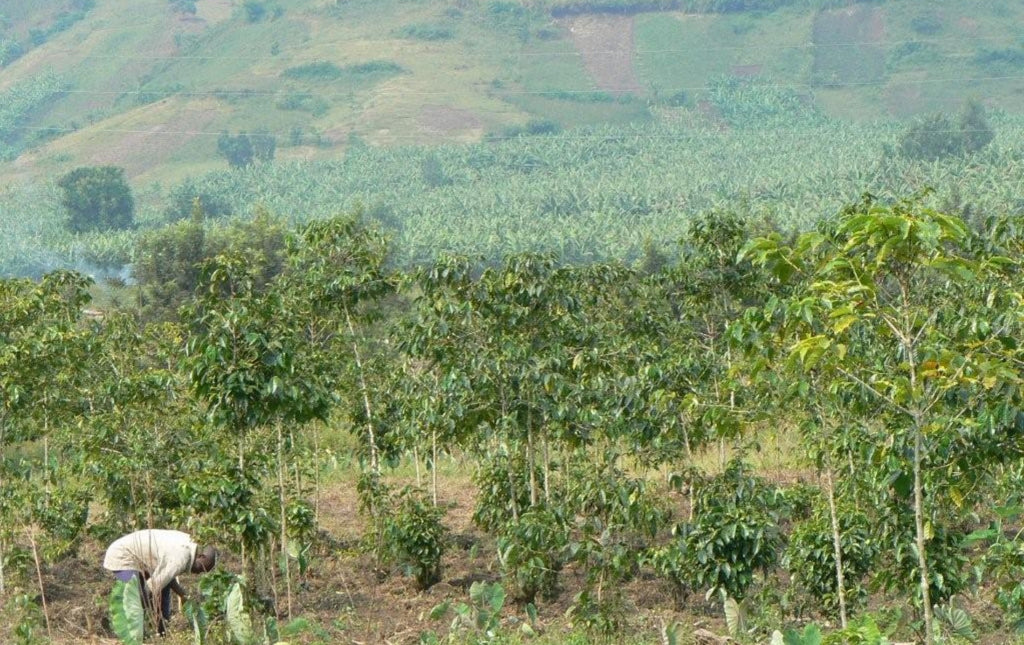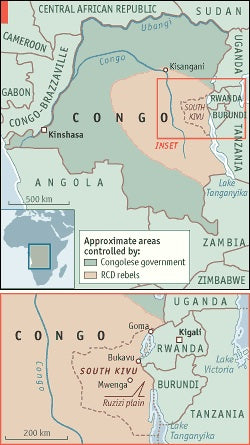HG co-founder and director Chris Treter shares thoughts en route to the Congo, where he will meet with coffee farmers in the beginning stages of a trade relationship.
As I cross the Atlantic Ocean on the beginnings of a 36-hour journey to eastern DR Congo, I struggle to find an easily digestible way to explain why I am looking forward to going to one of the most dangerous places in the world. There is just so much to say. Usually people will title a blog like this with all-too-cliched echoes of "Into the Heart of Africa" or "A Journey into the Heart of Darkness"--referencing its geography or Joseph Conrad's book about the region. Others would relate what is taking place in DR Congo to child soldiers, frame the issue around sexual violence (it is estimated that a woman is raped, on average, every minute in the country), or position the blog around the conflict minerals that find their way into each of our cell phones, gaming equipment and jewelry.

[Pictured above: a Congo coffee field. Photo courtesy of Richard Hyde, Twin Trading.]
For me, this very complicated country and history is simply an example of prolonged human tragedy manifested via colonial exploitation, dictatorship, unchecked globalization, and the lack of will of the international community to step forward in a land that doesn't hold the vast economic significance of other areas of the world nor the simple one liner to satisfy our ADHD news cycle. DR Congo is home to many of the economic slaves of the world - both historically and today. The country the size of Western Europe has a population of 70 million with an average life expectancy of just 51 years and an average income of only $200 - making it tied for the poorest, least developed country in the world. But through all of that stands the perseverance of the human spirit: I'll briefly try to boil down much that I have been studying here and attempt to explain why working to build relationships in fair trade coffee is important in such a volatile and war-torn region.
The first contact with the original populations of the Congo were explorers hell bent on conquering the last impenetrable part of Africa. Dr. David Livingstone searched for the source of the Nile. One of the last large slave traders, Zanzibari slave magnate Tippu Tip, killed and captured thousands. Henry Morton Stanley not only found a missing Dr. Livingstone ("Dr. Livingstone I presume," he famously quipped) but was also the first to travel the length of the Congo River and essentially set in motion the colonization of the Congo for King Leopold II from Belgium. King Leopold II ran the Congo as his own personal playground of riches to be exploited. He expropriated rubber and ivory, murdering nearly a million via a system of forced labor. After massive pressure from one of the first international human rights movements whose activists included Mark Twain, King Leopold II capitulated and handed over control of the Congo to Belgium.
The Belgians were soon toppled in the 1960s African Liberation Movement that finally worked to rid much of the continent of the oppressive and exploitative colonization. As such, in 1960 Joseph Mobutu ruled the country for 32 years. Renaming it Zaire, he worked to build national unity. For awhile it was believed Zaire would prosper, but eventually Mobutu destroyed the country's institutions. Corruption and lack of central governing ruled, and vast amounts of wealth from the abundance of natural resources landed in the hands of few.
Then in 1994 the genocide in neighboring Rwanda, leading to the deaths of over 800,000 mostly Tutsis at the hand of the ethnic Hutus, sparked what would very soon become the deadliest war in modern African history. Once the Tutsi leadership gained control of the situation, they drove over 2 million Hutus over the border into DR Congo. Mobutu allowed and hosted over 10 different foreign armed groups in his country. Not pleased, Angola, Rwanda, and Uganda formed a coalition which led to the ousting of Mobutu in 1997. Relative peace reigned for nearly a year under the new leadership of Laurant Kabila but soon enough, in 1998, Uganda and Rwanda fell out of sorts with Kabila and major war struck the country--especially in the North and South Kivu region, home to some of the finest specialty coffees in the world.

Between 1998-2003, government forces supported by Namibia and Zimbabwe battled rebels backed by Uganda and Rwanda in what is known as Africa’s Great War. The humanitarian crisis and regional skirmishes that have ensued since have led to the deaths of nearly 6 million people. But most Americans have been completely unaware. Our brainwaves have been saturated with the lifestyles of 24-hour news channels that have focused our attention on the wars of the Middle East--where we get our oil. Meanwhile, Africa’s Great War, which had the most deaths of any war since World War II, has gotten nearly no play in our media or focus on Capital Hill. Today dozens of armed groups control many of the mines that produce the gold, tin, tungsten, and tantalum that you find in your cell phone. In fact, the former Secretary General of the UN, Kofi Annan, recently released a report finding a discrepancy of over 1 billion dollars in mining revenue in the DR Congo. As a result, a major conflict-free movement has been sparked, currently pushing Nintendo to create transparency initiatives to ensure their minerals are not sourced from rebel-held mines in DR Congo.
And what of the United States’ role in this Great War? As pointed out by The Friends of the Congo, a leading NGO in the U.S. working to support a peaceful resolution to the atrocities in DR Congo, “Rwanda and Uganda are allies of the United States; some would even say they are client states to US and British interests. Both countries receive financial and military aid from the United States, World Bank and other Western institutions. This aid has continued unabated even during the invasions of the Congo. During a Congressional Hearing in 2001 held by Congresspersons Tom Tancredo and Cynthia McKinney, it was documented by experts under oath that the US provided military aid to Rwanda during its first invasion of Congo in 1996."
Given all this history, it is simply key that Higher Grounds jumps in on the reemergence of coffee in eastern Congo as a means to help foster peace through economic development not based on conflict or exploitation: a new form of doing business in the region. It was for that very reason that when I met Richard Hyde of Twin Trading 4 years ago and heard the story of a post-war reemergence of the specialty coffee sector in DR Congo, I was hooked and made it an eventual priority to find a way to support the growers of the region through fair trade. Through coffee, it is hoped by many, local Congolese can begin to rebuild their communities following years of strife.
Fast forward to today, and I am heading on a two-week trip with Richard into the Kivu region of DR Congo to solidify a relationship to help purchase coffee from Furaha Coffee Co-op via Cooperative Coffees as their first buyer. According to Twin Trading, who helped organize and train the co-op, “Located around the Mutumbala valley in the eastern DR Congo, in the mountains to the west of Lake Tanganyika, the farmers live in perfect coffee growing country. However, many families had been forced to flee the land due to unrest for many years and have only recently returned and started planting coffee.” Along the way we will be meeting with two other co-ops that Twin Trading has been working with, one of which we will also be purchasing coffee from this year.
Today the situation in the Kivu region remains very tense. This past November (2012), the M23 rebel movement (an organization that defected from the Congolese Army following failed peace negotiations in March 2009 and comprised mostly of Tutsi's--the same ethnicity of the leaders of Rwanda) took over the city of Goma, the largest city in Eastern DR Congo and the location where our coffee will be processed. Upon retreat, the Congolese Army, made up of many former rebels integrated into the army via the peace agreements, went on a raping spree, gang raping 133 women and children over the course of 24 hours. After international pressure on the rebels and the government of Rwanda (accused of backing M23), the M23 rebels retreated.
These troubles have led to over 2.6 million internal refugees in DR Congo. According to the Internal Displacement Monitoring Centre's (IDMC) latest report released in May, armed conflict in eastern Congo intensified "dramatically" during 2012, driving up the number of displaced people to record levels.
Meanwhile, in March 2013, the United Nations authorized a 3000-strong "Intervention Brigade," made up of Malawian, South African, and Tanzanian soldiers, to be the first ever UN force authorized to go on offensive attacks of rebel positions. They join the 17,000 UN peacekeepers currently in the region and form the largest peacekeeping force in the world.
M23 is not taking this new "Intervention Brigade" lightly. In May, skirmishes took place between the Congolese army and the M23, leaving 19 dead. On May 23, the Secretary General of the UN came to Goma, on the shores of Lake Kivu, achieving a ceasefire between M23 and the Congolese Army. However, last week, peace talks broke down with representatives of the Congolese government walking away. M23 militants are speaking out on Twitter multiple times a day stating the government is not looking in the best interest of the people and are preparing for attack.
A glimmer of hope remains with a New Peace Process initiated in February: “Framework for Hope” has been made even more real by a $1 billion commitment to development from the World Bank. Via her diplomacy after the genocide in Rwanda, the former Irish president Mary Robinson has formed relationships with Joseph Kabila (DR Congo), Paul Kagame (Rwanda), and Yoweri Musevini (Uganda). At the same time, U.S. Secretary of State John Kerry has named former Senator Russ Feingold as the Special Envoy to the Great Lakes Region of Africa. Advocacy organizations are cautiously optimistic about the appointment.
The Enough Project, with 18 other NGO Advocacy organizations monitoring the situation, heralded Feingold’s appointment as a step in the right direction but stated, "There are so many terrible symptoms of the crisis afflicting the Democratic Republic of the Congo and its Great Lakes neighbors–and so many international efforts to deal with them–that policy makers can lose sight of the fundamental roots of these problems. In our view, the U.S. and the international community have failed to give sufficient priority to two root causes: (1) the failure of DRC’s democratic elections and institutions and (2) the absence of a comprehensive regional peace process. Unless these central issues are addressed, ongoing international programs to strengthen Congolese security forces, improve governance, promote human rights, and foster sustainable economic development will founder."
Meanwhile, our coffee growing friends remain resolved to continue down the path of staying out of the conflict and working to rebuild their communities. And therein lies the inspiring part I hope to learn more about: in the face of such turmoil, history of oppression and exploitation, the human spirit remains resolved to always aim for a better future. That is a resolve that all of us hold no matter our struggle and circumstance. Unfortunately for the coffee farmers of eastern DR Congo, however, it is put to the test daily at a level you or I will never truly understand.





